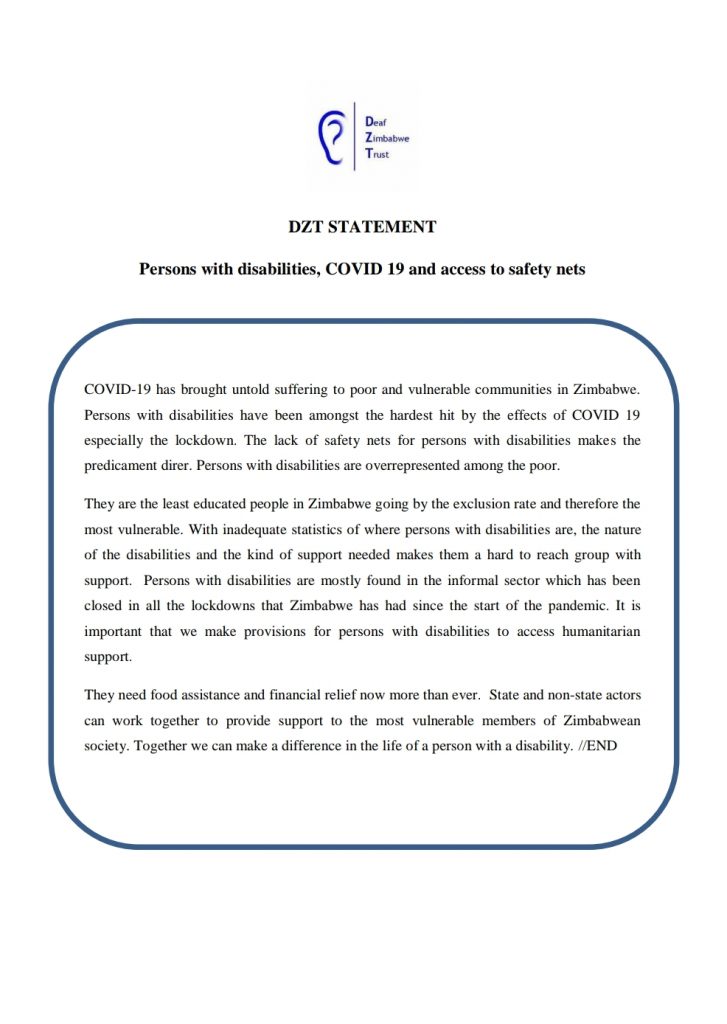The impacts of Cyclones on PWDs

By Irene Mhlanga
The realities of climate change have been witnessed around the globe with the frequency of heat waves, cyclones/floods, droughts and hurricanes. Zimbabwe has experienced two tropical cyclones (Cyclone Idai and Cyclone Eloise) in a space of two years and persons with disabilities were among those affected. In 2019 Zimbabwe was hit by Cyclone Idai and approximately 270 000 people were affected with 230 people left with permanent disabilities. This year Cyclone Eloise has also swept through the South-Eastern parts of Zimbabwe killing three people in Chipinge, destroying 15 houses and damaging two schools.
Tropical cyclones are intense circular storms that originate over the warm tropical oceans with more than 119 kilometres per hour speed and heavy rains. Tropical cyclones have the largest impact on the world’s poorest and most vulnerable people, Within this group, 20% are Persons with Disabilities (PWDs), who are nearly always disadvantaged. PWDs suffer more from the impacts of climate change due to underlying conditions, which often do not allow them to move and to independently access services. Persons with disabilities have lower ability to receive or act upon emergency information or instructions, or to communicate their needs in an emergency or evacuation situation. Information about extreme weather or other emergency is not always designed or delivered in a way that reaches PWDs, for example those who have hearing loss, low vision, or reduced mental capacity. Persons with disabilities also face additional physical challenges associated with evacuations which can make health impacts worse, especially if local emergency response plans do not adequately anticipate and address the special needs of these populations.
However inclusion of PWDs in planning for emergency response will reduce their impacts. Effective communication technologies are necessary for alerting people who are Deaf or Hard of Hearing on evacuation planning. In places where technology is inaccessible, use of community leaders is vital as word of mouth goes around faster in rural areas enabling access to information to persons with disabilities in these areas. Ramps into shelters, accessible bathrooms, and feasible evacuation transportation are essential for mobility-impaired persons, including those using respirators, and indeed for anyone unable to safely utilize standard buses. Creation of disability inclusion, via specific measures of access and accommodations remove these barriers to participation in the mainstream.
DZT embarks on GBV awareness at water points
By Dorothy Nyika
Deaf Zimbabwe Trust recently engaged in the Hurukuro Patsime dialogue in a bid to sensitize men and women on Gender Based Violence at public water points.
The Three day workshop was conducted in Chitungwiza as part of the Borehole Diaries project meant to unearth and address the hidden and complex Sexual Gender Based violations against girls and women at public water collection points.
Speaking at the event a representative from the Zimbabwe Republic Police Victim Friendly Unit said the water shortages in different parts of Chitungwiza had made women and girls vulnerable to different forms of abuse.
“Women and girls spend lots of time at water points with some of them waking up at odd hours to go and fetch water; This has increased their vulnerabilities on issues of GBV”
“We therefore urge people to report cases of GBV immediately as they occur in order to put a stop to these violations”
DZT representative Dorothy Nyika said the Hurukuro Patsime Dialogue was meant to empower citizens including persons with disabilities with information and to curb issues of abuse at boreholes.
“This dialogue is important as it seeks to sensitize men and women on violence against women and girls including those with disabilities at public water points and to create a friendly environment to encourage everyone to participate”.
She added that some disabilities are invisible therefore communities should be sensitized on invisible disabilities to prevent victimization of people with such disabilities at water points.
The Ministry of Primary and Secondary Education encouraged parents to allow children time to read and to desist from child labour practices during lockdown.
The activity was in line with commemorating 16 days of activism with its national theme; End gender based violence: Fund, respond, prevent, collect.
The dialogue comprised of members of the Borehole Diaries multi stakeholder committees which include Deaf Zimbabwe trust (DZT), Shamwari Yemwanasikana (SYS), Community Water Alliance (CWA), Chitungwiza Municipality, Social Welfare, Chitungwiza Hospital, Family Support, Victim Friendly Unit (VFU), Ministry of Primary and Secondary Education (MoPSE) Ministry of Information ,Publicity and Broadcasting Services and the Ministry of Women affairs.
Members of the community and community leaders including people with different disabilities were also present.

